
Fugitive Economic Offenders Ordinance, 2018 Gets Passed; Allows Authorities To Attach And Confiscate The Properties
23 April 2018 8:23 AM GMT
In a much-needed move, President Ram Nath Kovind passed the Fugitive Economic Offenders Ordinance, 2018 on April 22. The ordinance gives power to the government to attach assets of economic offenders like bank defaulters and fraudsters within and outside India. This will empower the government to deal with fraud cases like PNB scam. Also, it is expected that this law would bring back defaulters like Nirav Modi, Vijay Mallya and Mehul Choski to face trial in India.
It was noticeable that the current civil and criminal provisions are not enough to deal with the severe financial disaster that deteriorates India’s economic health.
The Ordinance makes provisions for Special Court under the Prevention of Money-laundering Act, 2002 to declare a person as a Fugitive Economic Offender.
What Is A Fugitive Economic Offender?
Fugitive Economic Offender is an individual against whom a detained order has been passed for a scheduled offence, and that person has left India to avoid criminal prosecution and later refuses to come back to face a criminal trial. A scheduled offence means an economic offence included in the schedule to this ordinance. To lessen the burden of courts, only those cases would be included within the purview of this ordinance where the total amount of such offences involved more than Rs 100 crore.
Key Points Of Fugitive Economic Offenders Ordinance
The ordinance will help the government in preventing offenders escape from the course of law by remaining outside the jurisdiction of Indian courts. This ordinance is also said to include those defaulters against whom no criminal cases are filed.
According to Livemint, the Finance Ministry stated, “The need for the ordinance has arisen as there have been instances of economic offenders fleeing the jurisdiction of Indian courts, anticipating the commencement, or during the pendency, of criminal proceedings.”
“The absence of such offenders from Indian courts has several deleterious consequences—first, it hampers investigation in criminal cases; second, it wastes precious time of courts of law, third, it undermines the rule of law in India,” it added.
Further, it is aimed at speedily reviving losses to public sector banks or exchequer in cases like the alleged jeweller Nirav Modi’s $2 billion fraud. Notably, the Finance Ministry stated that lack of presence of such offenders in Indian courts squanders precious time of the court, impedes the rule of law and most importantly hinders the probe.
According to The Press Trust of India, the Finance Ministry said, “The existing civil and criminal provisions in the law are not entirely adequate to deal with the severity of the problem.”
What If An Offender Surrenders?
Proceedings under the proposed ordinance would be ceased by the law only if an economic offender comes back to India to face criminal suit and surrenders to the apt jurisdictional court.
It provides required constitutional protection when it comes to hearing the person through counsel as it permits them to file a reply. The offender is also allowed to appeal to the High Court whether in India or abroad.
“It is expected that a special forum to be created for an expeditious confiscation of the proceeds of crime, in India or abroad, would coerce the fugitive to return to India to submit to the jurisdiction of courts in India to face the law in respect of scheduled offences,” as per The Indian Express.
The government is hopeful that this Act would aid financial institutions like banks to recover their financial loss and improve the financial health of these institutions.
Procedure
- For a declaration that an individual is a fugitive economic offender, an institution or bank has to apply to the special court
- Attachment of alleged crime and the property of a fugitive economic offender is a must
- A special court would issue a notice to an individual alleged to be a fugitive economic offender
- Seizing the property of a person declared as a fugitive economic offender
- An offender cannot make any civil claim
- Under the act, an administrator would be appointed to dispose of the confiscated property.
Background
The Bill was placed in the Lok Sabha’s during a recent budget ending session of the Parliament, but it could not be moved further as both houses faced persistent disruptions on several issues.
Under the Prevention of Money-laundering Act, 2002, the new change in the Bill makes prerequisites for Special Court to affirm a person as a Fugitive Economic Offender.
 All section
All section













